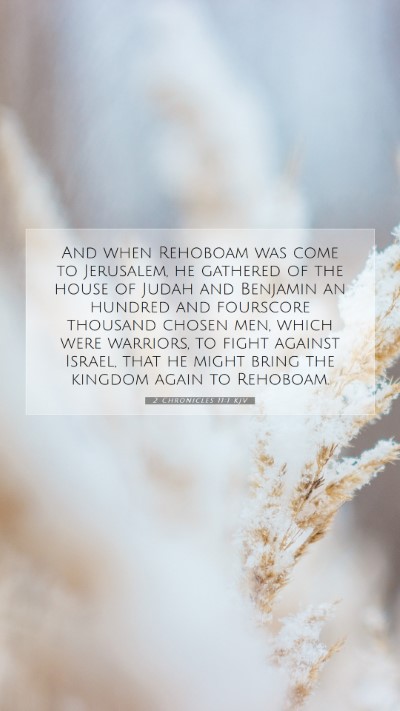Understanding 2 Chronicles 11:1
The verse 2 Chronicles 11:1 records a pivotal moment in the narrative of the Israelite kingdoms, marking the consequences of a significant event in the history of God's people.
Bible Verse Meaning
This verse captures the response of Rehoboam, Solomon's son, after the division of Israel. He assembles the choicest men of Judah and Benjamin to secure his rule against the northern tribes led by Jeroboam.
Bible Verse Interpretations
The interpretation of this scripture has multifaceted layers, seen through the lenses of leadership, faith, and the unfolding of God's plan for His people.
Matthew Henry's Commentary
Matthew Henry notes that Rehoboam's actions demonstrate human tendencies toward self-preservation and the desire to maintain power. Henry emphasizes the importance of moral character in leadership, illustrating how Rehoboam’s inclination to rely on military strength ultimately led to further division and unrest.
Albert Barnes' Commentary
Albert Barnes expands on the implications of Rehoboam's choice to gather forces. He highlights the significance of Judah and Benjamin as the only remaining tribes loyal to the Davidic line at this juncture. Barnes notes that this moment is crucial in understanding the legitimacy of Rehoboam's kingship and the divine orchestration behind the divisions in Israel.
Adam Clarke's Commentary
Adam Clarke provides a historical context, linking the events in 2 Chronicles 11:1 to the broader narrative of Israel's monarchy. Clarke discusses how Rehoboam's decision reflects a lack of faith in God’s promises and points out the spiritual ramifications that arise from actions rooted in fear and not in faith.
Key Themes
- Leadership and Legacy: The choices of Rehoboam set the stage for subsequent political and spiritual crises in Israel.
- Divine Guidance: God's hand is seen in how events unfold, even amidst human failures and decisions.
- Faith vs. Fear: Rehoboam's reliance on military might over divine direction serves as a cautionary tale.
Cross References
- 1 Kings 12:1-24: Provides a parallel account of the division of the kingdom.
- 2 Chronicles 10: Offers context on the counsel Rehoboam received and its implications.
- Jeremiah 3:10: Reflects on the unfaithfulness of Israel, pertinent to understanding the consequences of Rehoboam's reign.
Application of the Verse
This scripture serves as a profound reminder of the importance of seeking divine wisdom in leadership. When faced with decisions that could lead to division or discord, it calls on believers to reflect on their dependence on God rather than solely on their own understanding or strength.
Conclusion
2 Chronicles 11:1 encapsulates the themes of leadership, faith, and divine providence in a critical moment of Israel's history. Its study and interpretation enrich our understanding of Scripture and invite deeper reflection on how these ancient narratives still resonate in our contemporary lives and leadership practices.


